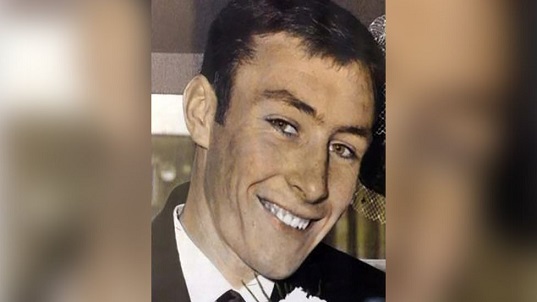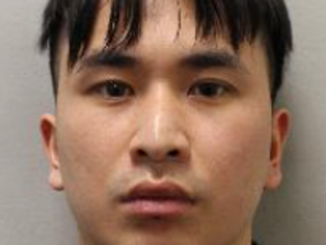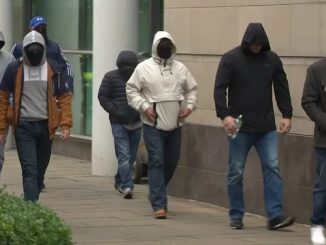
Two former paratroopers accused of the murder of an Official IRA man in 1972 have been formally acquitted after their trial collapsed.
Joe McCann, 24, was shot in disputed circumstances in Joy Street in the Markets area of Belfast in April 1972.
The court heard he was evading arrest when soldiers opened fire, killing him.
Soldiers A and C, both in their 70s, had pleaded not guilty. The men admitted firing shots but said they had acted lawfully when doing so.
Both soldiers were interviewed by a police legacy unit, the Historical Enquiries Team (HET), in 2010 and it was this evidence that formed a substantial part of the prosecution’s case.
The judge ruled this evidence as inadmissible and the Public Prosecution Service (PPS) on Tuesday confirmed it would not appeal against that decision, meaning the case could not proceed.
After the prosecution confirmed it would be presenting no further evidence in the case, the judge told both former soldiers: “In the circumstances ,Mr A and C, I formally find you not guilty of the charge of murder.”
‘Failure of the state’
Speaking outside court, Mr McCann’s daughter Aíne said there had been “a failure of the state at all levels” in relation to her father’s death.
“The RUC [Royal Ulster Constabulary] failed, the criminal justice failed, not only in this case but in the case of many other families,” she said.
Mr McCann’s family are to apply to the attorney general to open an inquest into his killing.
Their solicitor Niall Murphy said: “This ruling does not acquit the state of murder.”
He added: “Today is not the end of the McCanns’ journey for justice.”
Solicitors for the former soldiers said the prosecution should “never have got off the ground” and called for an inquiry led by a senior judge to investigate “the decision-making process and to ensure that the decision to prosecute these veterans was not political.”
In a statement, the Public Prosecution Service (PPS) confirmed it had decided to offer no further evidence against two former soldiers.
Deputy Director of Public Prosecutions Michael Agnew said despite the verdict, the PPS was “satisfied” the case had been properly brought before the courts.
Mr Agnew said evidence received in 2016 relating to the case was subjected to “a very thorough and careful examination by a team of experienced lawyers, including senior counsel” before the test for prosecution was met.
“The case overcame a number of legal challenges before reaching trial,” he said.
“These challenges included an abuse of process application following which a High Court judge ruled that there was no unfairness in the decision to prosecute and that in all the circumstances the defendants could get a fair trial.”
He added that the PPS “fully respected” the judge’s ruling and acknowledged “the enduring pain of the McCann family and how difficult this development has been for them”.
Mr Agnew said when the full written judgement became available, the PPS would “carefully consider whether it has the potential to impact upon any other cases that are currently before the courts”.
Det Supt Stephen Wright of PSNI’s Legacy Investigation Branch said: “We will await the publication of the written judgment and take time to consider it fully and any impact it might have on other legacy investigations.”
1972 evidence ‘dressed up with 2010 cover’
The trial opened last Monday and heard a day of evidence before moving to the issue of whether statements and interviews given by the ex-soldiers would be admissible.
The court was told that evidence implicating the soldiers came from two sources – statements given to the Royal Military Police in 1972 and interview answers given to the HET in 2010.
The PPS accepted that the 1972 statements would be inadmissible in isolation, due to deficiencies in how they were taken including that the soldiers were ordered to make them and they were not conducted under caution.
However, prosecutors argued that the information in the 1972 statements became admissible because they were adopted and accepted by the defendants during their engagement with the HET in March 2010.
However, the judge said it was not legitimate to put the 1972 evidence before the court “dressed up and freshened up with a new 2010 cover”.
He questioned why the HET’s re-examination did not prompt a fresh investigation by the Police Service of Northern Ireland (PSNI), with the veterans interviewed under caution.
The judge suggested that course of action might have made a prosecution more sustainable.
‘Live the rest of their lives in peace’
Former Veterans Minister Johnny Mercer, who left the government in April over legal protections for troops who served during the Troubles in Northern Ireland, attended the trial.
Speaking after it collapsed, he said he was “delighted” for the former soldiers, adding he hoped they could “go and live the rest of their lives in peace”.
“The government has made very clear promises, and the prime minister has made very clear promises, on legislation to end the relentless pursuit of those who served their country in Northern Ireland,” he said.
“It is time to deliver on that.”
Four other cases in relation to Army veterans are currently before the courts.
Source: bbc.co.uk






Be the first to comment